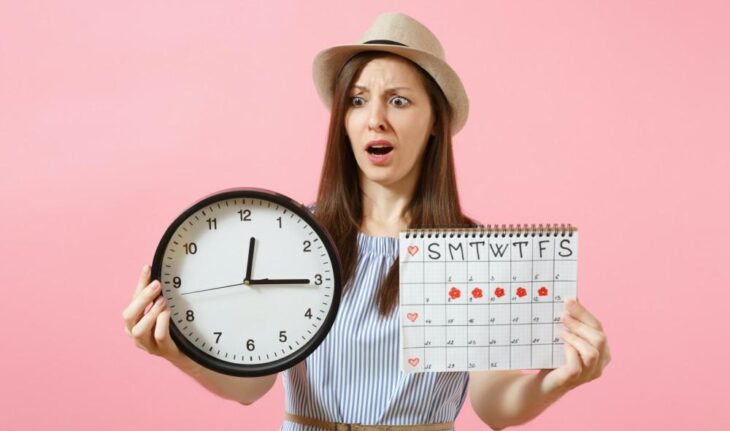Contents
- Reasons Your Period Might Be Late
- When to Seek Medical Attention
- Home Remedies to Help Relieve Menstrual Cramps
- Foods That Might Help Regulate Your Period
- When to Worry About a Late Period
- How much delay is normal in period?
- What is the most common reason for a late period?
- How can I make my period come?
- Should I be worried my period is 5 days late?
- What are the early signs of pregnancy?
- What are the symptoms of pregnancy at 1 week?
- How do you know if you are pregnant without a test?
- Does a toothpaste pregnancy test work?
- Why haven’t i gotten my period in 2 months
- Effects of not having a period for a long time
How late can a period be?
For the last week or so, I’ve been somewhat convinced that I’m pregnant. For the most part, this belief was paranoid, but also not entirely outside the realm of possibility. I had a proper French affair when I was in Paris a few weeks ago and at one point there was a broken condom situation, though we realized it was broken and replaced it with a fresh one prior to, ahem, any fluids reaching their apex, so to speak. But I know how babies are made and I’m a total hypochondriac, so when my period failed to arrive on the day it was supposed to, and the day after, and the day after that, and I started feeling gassier than usual, well, I began to panic. I started to type “gas sign of” into Google and the search engine, seemingly reading my mind, auto-filled the rest with “early pregnancy.”
Oh god, I thought. It was all but confirmed.
“Everyone, I think I might be carrying the French waiter’s baby,” I announced dramatically to my coworkers.
“I really doubt that,” said Ami, “But why don’t you take a pregnancy test to be sure.”

Please, Don’t Panic
As practical as that idea sounded, I wasn’t quite ready for confirmation of the status of my uterus just yet — mostly because I didn’t quite know how I felt about possibly being pregnant — so I decided to research all the possible reasons for why my normally prompt period might be late and I (and you, if you’re in a similar situation) shouldn’t be panicking. Here are the seven most likely reasons your period might be late besides pregnancy … and if you make it to the end, you’ll find out whether or not my panicking was all for naught.
7 Reasons Your Period Might Be Late

Source: womenshealthmag.com
1. A Change In Your Regular Routine:
Did you start a new job? Change your wakeup time? Go on vacation? It can take your body a little time to adjust to a change in your regular routine and that can impact your regular cycle, especially if the change started at the time you would normally ovulate, causing a delay or even a skipped cycle.
Likelihood That This Is Impacting My Period: Moderate. I mean, I did just spend a week doing nothing but eating cheese and drinking wine in France. Usually, my routine consists of working and then eating cheese and drinking wine, so…
2. Stress:
Your emotions, particularly stress, can have a major impact on the regularity of your menstrual cycle. And if you’re stressing about why your period is late, that could actually delay its arrival even more. Mother Nature is a cruel mistress!
Likelihood That This Is Impacting My Period: High. Looking back over the last few months, I’ve been stressed a lot — about my dad’s death and dealing with his estate, about work, etcetera — and I might just be seeing the effects of that on my cycle now.

Source: Flo.com
3. Illness:
Being sick at the time you normally would ovulate can delay ovulation — and if you ovulate late, you’ll get your period late. So if your period hasn’t arrived on schedule, think back a few weeks — were you under the weather?
Likelihood That This Is Impacting My Period: Minor. I haven’t been sick recently unless you count being hungover.
4. Pill Poppin’:
Taking a new medication or changing the dosage on an existing medication can affect all aspects of your body’s well-being, including your menstrual cycle — that’s why your doctor, including your gynecologist, always wants to know each and every medication that you’re on. The morning-after pill (Plan B) can also make your period late.
Likelihood That This Is Impacting My Period: Minor. I’m on a couple of medications, but have been for while and haven’t changed my dosages at all.

Source: timesofindia.indiatimes.com
5. Weight Issues:
A major change in your weight — either by gaining a lot or losing a lot of weight — can throw your ovulation cycle off. People who are underweight or extremely overweight sometimes don’t have a period at all — which is not very healthy. Overall, an incredibly wonky or nonexistent period is a sign of possible health issues.
There is a natural solution for a late or inconsistent period, check this!
Likelihood That This Is Impacting My Period: Minor. Well, I’ve gradually gained maybe 7-10 pounds over the last year, but I don’t consider that a “major” change in my weight — my weight has generally fluctuated by the same 5-10 lbs for years.
6. Exercising Excessively:
Have you been hitting Soul Cycle every day after work? Training for a marathon? If you’ve taken up a new and intense exercise routine, your period might be thrown off. In fact, people who engage in extreme physical activity sometimes see their periods delayed.
Likelihood That This Is Impacting My Period: Minor. Um, I’ve been to yoga, like, four times in the last four months. I took my first Soul Cycle class ever last night and it was awesome but rough. The most exercise I generally get is from manically cleaning my apartment or walking my dog. Fitness fiend, I am not.

Source: climatejusticecampaign.org
7. Miscalculation:
The average menstrual cycle is 28 days, but many, many women have shorter or longer cycles and don’t chart them correctly — so it may be that your period is not actually late. Additionally, the majority of women have cycles that are irregular and don’t necessarily realize it. If your period is early even by a few days one month, it may arrive late the following month.
Likelihood That This Is Impacting My Period: Major. As I obsessively looked back through my calendar and tried to remember when I had my last few periods, I realized that the first day of each period was either a Monday, Tuesday, or Wednesday. I had always thought of myself as having a regular ol’ 28 cycle. but clearly, I don’t; clearly, my cycle is slightly irregular and so what I consider “late” may not actually be late.
These are a few of the more basic, everyday reasons that an otherwise healthy woman, who is not pregnant, might have a late period. There are of course other, more serious reasons — a thyroid condition, Polycystic Ovarian Syndrome, or an eating disorder for example. If you’ve taken a negative pregnancy test and your period is more than a couple of weeks late, you should see your gynecologist just to make sure everything is a-okay.
As for me? I took a pregnancy test on Saturday morning, the most nerve-racking experience ever because I had to drink, like, a gallon of water before I felt like I had to pee enough. After three minutes, I got my answer — Not Pregnant. No baby Fracois or Amelie for me. A tiny, tiny part of me felt a little sad — I’m planning on having a baby in the next three years — but I mostly felt relieved, because I am really committed to having a child on my own terms, at the right time.
Oh, and sure enough, Sunday morning, I got my period.
Original Author: Amelia McDonell-Parry @xoamelia
VIDEO: 8 Reasons Your Period Is Late
Reasons Your Period Might Be Late
Late periods can be a source of worry and anxiety for many women. Even if your cycle is usually regular, you can still panic when it’s a few days or weeks later than expected. It’s normal to question what may have caused the delay and wonder about the potential implications. The good news is that there are a number of different reasons why your period might be late, some of which are completely normal and nothing to be concerned about. In this blog post, we will explore these possibilities in more depth so that you can gain a better understanding of what might have caused your late period.
When to Seek Medical Attention
If you’re sexually active and your period is more than a week late, you should take a pregnancy test. If the test is negative and your period still doesn’t come, make an appointment with your doctor to rule out any underlying medical conditions.
Other reasons to see a doctor include:
– You’ve never had a period before (primary amenorrhea)
– Your periods used to be regular, but now they’re irregular (secondary amenorrhea)
– You’re bleeding heavily or for more than 7 days
– You have severe pain during your period
– You have missed more than 3 periods in a row
Home Remedies to Help Relieve Menstrual Cramps
There are a few things you can do at home to help relieve menstrual cramps. Taking over-the-counter pain medication like ibuprofen or acetaminophen can help. You can also try placing a heating pad on your abdomen or lower back. Taking a hot bath or using a warm compress can also help. Some women find that certain herbal teas, such as chamomile or ginger tea, help to ease menstrual cramps. If you have severe menstrual cramps, you may want to see your doctor to rule out any underlying medical conditions.
Foods That Might Help Regulate Your Period
There are a few specific foods that have been shown to help regulate your period. These include:
-Papaya: Papaya contains an enzyme called papain, which has been shown to help regulate menstruation.
-Pineapple: Pineapple also contains enzymes that can help with menstrual regulation.
-Green leafy vegetables: Green leafy vegetables are high in vitamins and minerals that can help the body function properly, including regulating the menstrual cycle.
-Nuts and seeds: Nuts and seeds contain essential fatty acids that the body needs for hormone production. This can help keep the menstrual cycle on track.
When to Worry About a Late Period
If your period is more than a week late, it’s time to take action. There are many possible reasons for a late period, some of which are harmless and others that can be more serious. If you’re sexually active, the most likely reason for a late period is pregnancy. However, there are other potential causes of a missed or delayed period, such as stress, illness, travel, and certain medications.
If you’re not pregnant and you’ve been experiencing stress or illness, these may be the cause of your late period. Travel can also interfere with your menstrual cycle. If you’ve recently changed birth control methods or started taking a new medication, this could be the reason for your delayed period.
If you’re concerned about a late period, the best thing to do is take a pregnancy test. If the test is negative and you still don’t get your period within a few days, contact your doctor to discuss other potential causes of your missed or delayed period.
How much delay is normal in period?
If you’re wondering how much of a delay is normal when it comes to your period, the answer is that it varies from person to person. Some women have very regular periods, while others may experience some irregularity.
There are a number of factors that can affect the timing of your period, including stress, travel, and changes in your diet or exercise routine. If you’re not sure what’s causing your period to be late, it’s a good idea to speak with your healthcare provider. They can help you figure out if there’s anything to be concerned about.
What is the most common reason for a late period?
The most common reason for a late period is ovulation. When you ovulate, your body releases an egg from your ovary. This egg can be fertilized by sperm and result in pregnancy. If the egg is not fertilized, it will be released from your body during your next period.
How can I make my period come?
If you’re wondering how to make your period come, there are a few things you can do. First, consider whether or not you’re actually late. If it’s been less than 21 days since the start of your last period, you’re not technically considered late yet. However, if it’s been more than a week since you were supposed to start your period and you’re still waiting, there are a few things you can try.
One option is to take an over-the-counter medication like ibuprofen or aspirin. These medications can help to bring on your period by causing uterine contractions. Another option is to eat foods that contain lots of phytoestrogens, like soybeans or tofu. Phytoestrogens mimic the hormone estrogen in the body and can help to jumpstart your menstrual cycle. You could also try using a heating pad on your stomach or lower back. The heat can help to relax the muscles in your uterus and bring on your period.
If none of these methods work and you’re still concerned about why your period is late, make an appointment with your doctor. They can help to determine if there’s a underlying cause for your delayed menstruation and offer additional treatment options.
Should I be worried my period is 5 days late?
It’s not uncommon for women to experience a late period from time to time. There are a number of reasons why your period might be delayed, and in most cases, there’s no need to worry. However, if you’re concerned about your late period, here are a few things to consider:
– Are you under any type of stress? Stress can often delay menstruation.
– Have you been dieting or exercising excessively? extreme weight loss or gain can also affect your menstrual cycle.
– Are you taking any new medications? Certain drugs can interfere with your period.
– Have you recently had a baby or suffered a miscarriage? It’s not uncommon for periods to be irregular following pregnancy or miscarriage.
If none of these apply to you and your period is still late, it could be due to an underlying medical condition like polycystic ovary syndrome (PCOS) or thyroid problems. If you’re concerned about your late period, it’s best to consult with your doctor to rule out any potential health issues.
What are the early signs of pregnancy?
If you’re sexually active and your period is late, there’s a chance you might be pregnant. The earliest signs of pregnancy can include implantation bleeding, which usually occurs around the time your period would have been due. Other early signs can include nausea, fatigue, breast tenderness, and mood changes. If you think you might be pregnant, take a home pregnancy test or make an appointment with your doctor to confirm.
What are the symptoms of pregnancy at 1 week?
If you’re wondering whether you might be pregnant, you’re probably looking for signs and symptoms of pregnancy. Unfortunately, at one week after a missed period, it’s still too early to tell for sure if you are pregnant or not. However, there are some early signs and symptoms that may indicate pregnancy, such as:
– A missed period
– Nausea or vomiting (often called “morning sickness”)
– Breast tenderness or changes
– Fatigue or exhaustion
– Frequent urination
– Mood swings or irritability
Of course, these symptoms can also be caused by other things besides pregnancy, so if you’re experience any of them it’s important to take a pregnancy test to be sure.
How do you know if you are pregnant without a test?
If you’re wondering whether you might be pregnant, it’s important to know that there are a number of different ways to find out – some more reliable than others. The most reliable way, of course, is to take a pregnancy test. However, there are also a number of signs and symptoms that can indicate pregnancy, even in the absence of a positive test result.
Some common early signs of pregnancy include:
– Missed period
– Nausea/vomiting (particularly in the morning)
– Breast tenderness and swelling
– Darkening of the nipples
– Fatigue
– Increased urination frequency
Of course, it’s important to keep in mind that these signs and symptoms can also be indicative of other things (like stress or illness), so they don’t necessarily mean you’re pregnant. If you’re concerned or have any doubt, the best thing to do is to take a pregnancy test.
Does a toothpaste pregnancy test work?
Yes, a toothpaste pregnancy test does work. All you need is a small amount of toothpaste and urine. Simply mix the two together in a cup and wait for a few minutes. If the mixture turns blue, it means you are pregnant.
There are a few things to keep in mind when using this method, however. First, make sure to use plain white toothpaste – no gel or colored varieties. Second, it’s best to use first morning urine for the most accurate results. And finally, be aware that there can be false positives with this test – so if you get a positive result, be sure to follow up with a visit to your doctor just to be sure.
Why haven’t i gotten my period in 2 months
If you’re wondering why your period is late, there are a number of possible explanations. Maybe you’ve been under a lot of stress, or you’ve recently changed your birth control method. It’s also possible that you’re pregnant.
If you’re not sure what’s causing your late period, it’s best to talk to your doctor. They can help you figure out what’s going on and recommend the best course of action.
Effects of not having a period for a long time
If you’re not having a period for a long time, it could be because of a medical condition, such as polycystic ovary syndrome (PCOS) or primary ovarian insufficiency (POI). It could also be due to stress, being overweight or underweight, or taking certain medications. Not having a period can affect your fertility and put you at risk for bone loss. If you’re concerned about any of these effects, talk to your doctor.
